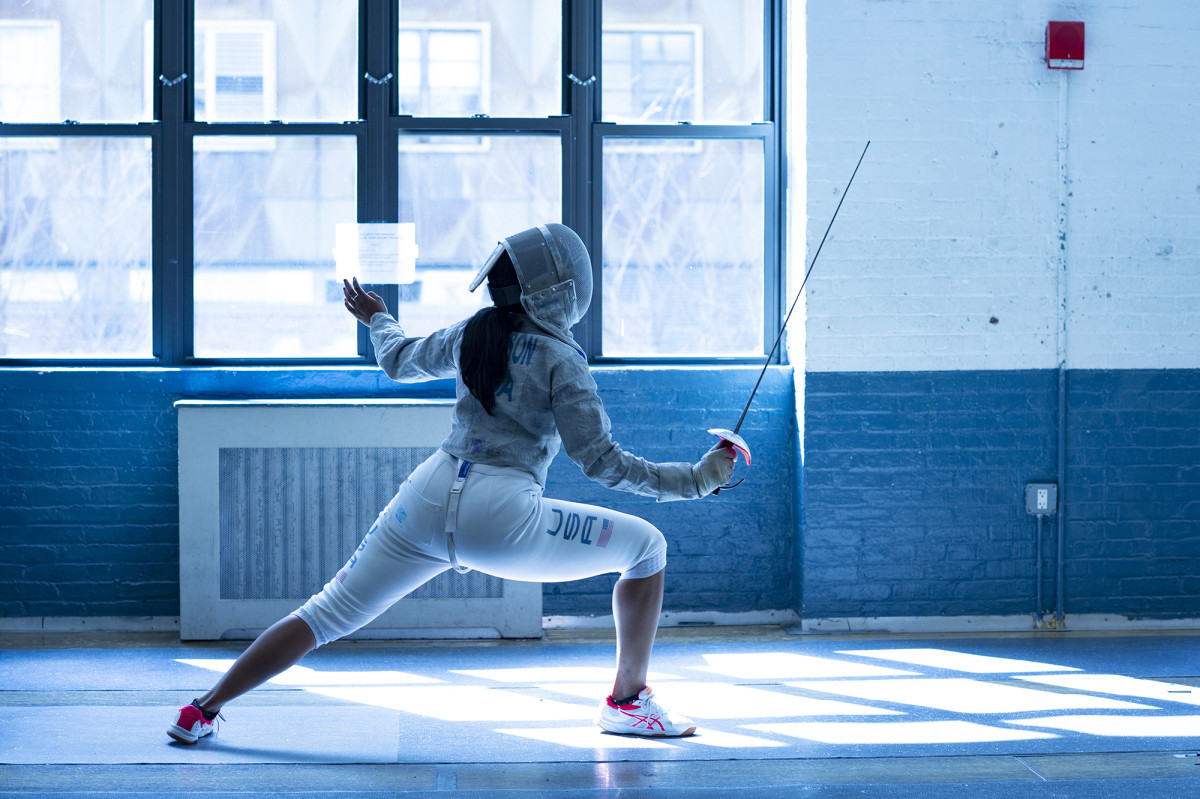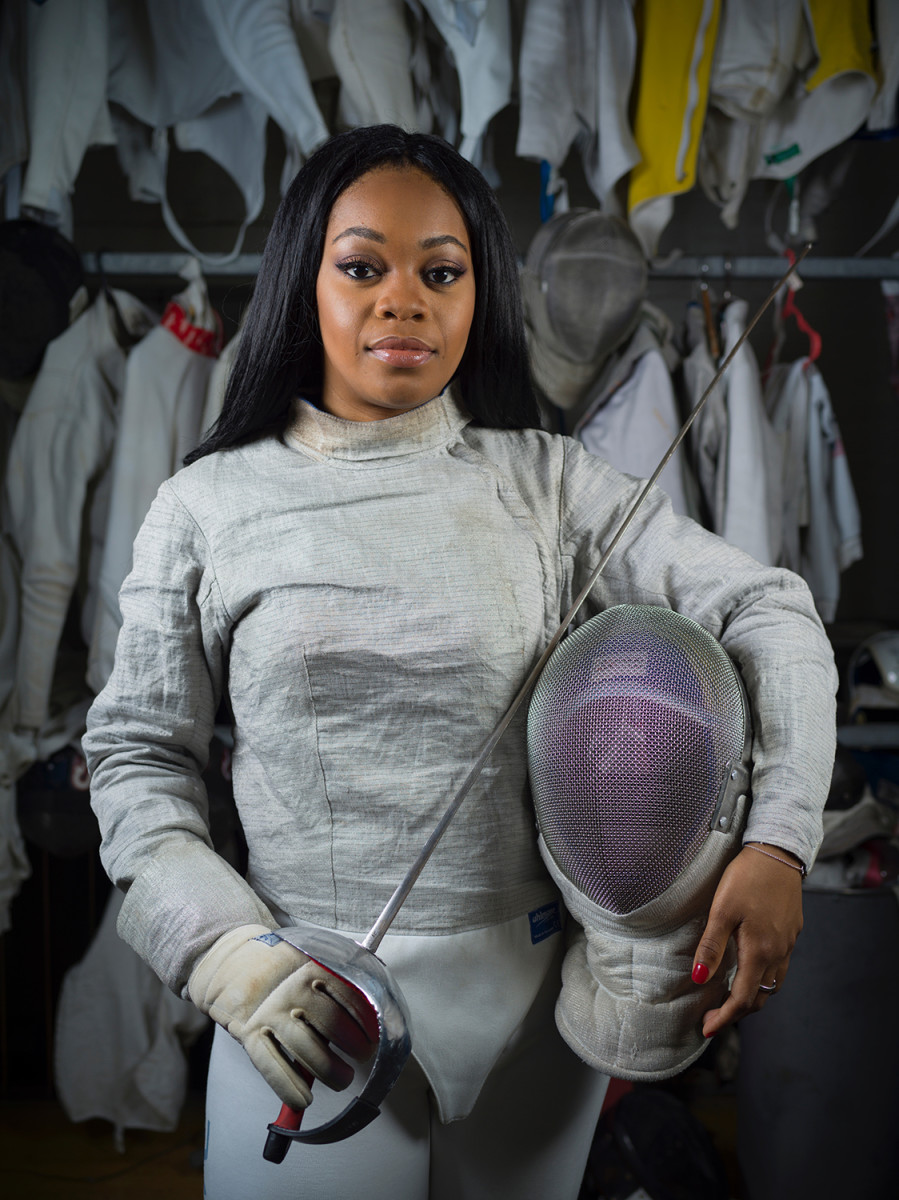Kamali Thompson Is a Modern-Day Superwoman
Get to know the next generation of must-know names that are changing the game in the series Introducing, where Sports Illustrated and Empower Onyx are celebrating the Black women and girls who are emerging leaders and rising stars in the sports world.

Kamali Thompson
Instagram: @KAMALITHOMPSON.USA
Twitter: @kamali_thompson
Name: Kamali Thompson, M.D.
Age: 29
Profession: Olympic alternate for U.S. Fencing team, orthopedic surgery resident
Hometown: Teaneck, N.J.
Sport: Fencing
Hobbies: Dancing, blogging, traveling, watching reality tv, relaxing with family and friends
Kamali Thompson doesn’t sit on the fence when it comes to life. When she makes decisions, she sticks to them—literally. As a professional fencer, U.S. Olympic alternate and orthopedic surgery resident, she is a modern-day superwoman wielding a sabre. She still manages to take life in stride, the perfect combination of confidence and humbleness. Whether in medical scrubs or fencing gear, she never lets them see her sweat. Thompson sat down to share how she found fencing and the unique ways she channels her superpowers.
The following interview has been lightly edited for clarity and length.

Empower Onyx: I have a confession about fencing: I'm intimidated by the outfit. How do you deal with it?
Kamali Thompson: (Laughs) At first, you're like, it's so much stuff. But fortunately I'm not a heavy sweater. If you are, you probably won't enjoy it. But it protects you, so it's worth it.
EO: Please explain how a girl from Teaneck, N.J., becomes a professional fencer.
KT: I'll admit that it's very weird. Like, it looks funny, the outfits are crazy. That's why I really hated it at first. I was 12 when I started high school. I have a baby face; I have glasses. The last thing I want to do is nerd activities. Then lo and behold, I started fencing, right. That's not where I wanted to be.
My mom and I were at an open house at my high school, and I went to the dance room because I was so excited to see what was going on and where I would be spending all my time in high school—or so I thought. We ended up walking past the cafeteria, and there was a fencing demonstration going on. My mom, for whatever reason, looked inside and she was fascinated. My high school coach, another Black woman, got into conversation with my mom for 20 minutes. By the end of the conversation, my mom said, O.K., well, you're going to start fencing now. Apparently my coach told her that I would be great in fencing because I was a dancer and the footwork would translate, and that I might be able to get a scholarship. That's pretty much all my mom needed to hear. After that, she told me I was going to fence.
EO: Now 17 years later, you’re still fencing. Why?
KT: The first thing is, I think every girl should do a sport. When we think sports, we think basketball and football, very standard sports. Also, people think if you're not the athletic type of girl, then you don't belong in sports—and that's just not true. Try different things like swimming, lacrosse, anything. There's a sport for you, even if it’s different. Young kids don't like different things; they want to fit in. I was one of them. I totally get it.
Embrace being unique, because being unique really helps you build a certain level of skills that other people won't have.
Once you really find what you love and what you're passionate about, just forget what everyone else is saying. Because if you're doing something different, people are always going to ask you why you're doing it. They’re going to doubt you, but if you love it and you're good at it's just going to take you far. I'm excited that I’m a fencer.
Funny thing: I recently had one of my bullies from middle school DM me last year and tell me that I'm an inspiration for her daughter. The people will laugh at you first, then later they'll be happy that you found your stride.
EO: Would you say that fencing is more of a mentally or physically demanding sport?
KT: I would say it's honestly the perfect combination of both. You must be in good physical shape, but you also have to be smart and very tactical. If you are the fastest, strongest person, that does not translate to winning in fencing—it doesn’t mean much. All it means is that you're fast and you're strong. If you're the smartest person, but you can't move on the strip, that doesn't help you either. Being in a great place physically is beneficial, but then you have to learn how to strategize, to adjust during bouts because balance happens so quickly. You really must master both sides.

EO: When you’re competing, what gets you in the zone?
KT: One thing I started doing like two seasons ago is watching sports documentaries, or sports movies, the day before and for 10 minutes on the morning of my competition. It really got me in the zone. I watched Creed and Creed 2. I love Michael B. Jordan, but the part where he's training to beat the Russian guy at the beginning of the movie, that gets me going. Also, I started watching The Last Dance with Michael Jordan. So that's my routine. And I do visualization in the evening and the morning, too.

EO: Talk more about your visualization routine.
KT: I can’t remember her full name, but a woman once said that if you stand in the mirror, like a superwoman, look yourself in the eye and say a positive mantra, it gives you confidence. And she's right.
EO: What was your mantra for balancing medical school and fencing professionally?
KT: I started fencing internationally during my first year of medical school. In terms of practice, studying, the competitions, that whole regimen made me efficient. Monday, I was taking care of 60 patients and I had about 13 consults, so you must be efficient. That's something that I learned from training and being in school at the same time: Do your task, make sure it's done well, make sure it's done correctly and then move on to the next one.
